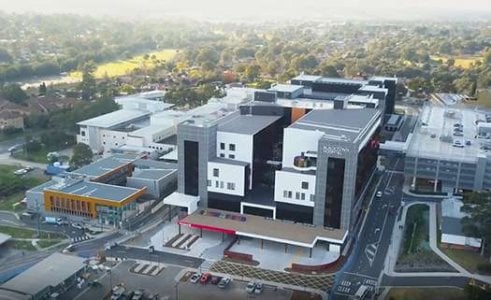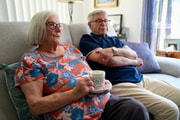'Something is going very wrong': Stories from one Aussie hospital tell grim reality healthcare systems face
By
Danielle F.
- Replies 44
Hospitals are a haven for support and healing for patients.
Yet, what happens if these havens also face issues that could affect the quality of care people receive?
Scenes from one of Australia's busiest hospitals sparked a wave of concern from the public and healthcare workers alike.
Blacktown Hospital's emergency department has been thrust into the spotlight as patients endured about 12 hours of waiting time before receiving medical attention.
A patient in the Sydney-based hospital lied on the emergency department floor at 8:30 am.
The patient, who arrived at the hospital at 10 pm the night before, was still waiting for a bed for hours.
Family members of the woman described the emergency department as 'inundated beyond belief'.
Other patients also resorted to sleeping on the floor due to the lack of beds and space.
Several reports also stated that patients have been going without food.
Another patient was also left without oxygen for five hours—adding intensity to the outcry.
A nurse from the hospital confirmed that these incidents were not isolated but rather a 'common occurrence'.
Shadow Health Minister Kellie Sloane wanted to address the crisis with urgency.
'Something is going very wrong at the moment at Blacktown emergency department,' she stated.
New South Wales Premier Chris Minns acknowledged the immense pressure public hospitals face.
'We want to do better when it comes to health outcomes,' Premier Minns stated.
NSW nurses and midwives also shared their frustration and exhaustion through a strike last Tuesday, where they walked off their duties for 12 hours.
Their demands for a 15 per cent pay rise were rejected despite facing the strain on hospital services, including emergency departments.
'I am beyond exhausted. It is about the money, but we have so many more important things that we have to fight for as well,' one nurse voiced out in an interview.
'It's not safe anymore for nurses and patients. You need to walk through an NSW hospital to see that for yourself.'
While sympathetic, Premier Minns defended the government's position regarding this decision.
Premier Minns stated that the requested pay rise is not feasible within the state budget.
He also argued that acceding to the nurses' demands would set a precedent—potentially leading to similar requests from police, teachers, and other public sector employees.
This could incur costs of over $6.5 billion over three years.
These troubling developments raised serious questions about the state of healthcare in Australia, particularly for those who rely on these services frequently.
The images and stories coming out of Blacktown Hospital are a stark reminder of the challenges healthcare systems face and the potential risks for patients seeking care.

Have you or a loved one faced similar challenges in hospitals? How do you feel about Australia's current state of healthcare? Share your experiences and insights with us in the comments section below.
Yet, what happens if these havens also face issues that could affect the quality of care people receive?
Scenes from one of Australia's busiest hospitals sparked a wave of concern from the public and healthcare workers alike.
Blacktown Hospital's emergency department has been thrust into the spotlight as patients endured about 12 hours of waiting time before receiving medical attention.
A patient in the Sydney-based hospital lied on the emergency department floor at 8:30 am.
The patient, who arrived at the hospital at 10 pm the night before, was still waiting for a bed for hours.
Family members of the woman described the emergency department as 'inundated beyond belief'.
Other patients also resorted to sleeping on the floor due to the lack of beds and space.
Several reports also stated that patients have been going without food.
Another patient was also left without oxygen for five hours—adding intensity to the outcry.
A nurse from the hospital confirmed that these incidents were not isolated but rather a 'common occurrence'.
Shadow Health Minister Kellie Sloane wanted to address the crisis with urgency.
'Something is going very wrong at the moment at Blacktown emergency department,' she stated.
New South Wales Premier Chris Minns acknowledged the immense pressure public hospitals face.
'We want to do better when it comes to health outcomes,' Premier Minns stated.
NSW nurses and midwives also shared their frustration and exhaustion through a strike last Tuesday, where they walked off their duties for 12 hours.
Their demands for a 15 per cent pay rise were rejected despite facing the strain on hospital services, including emergency departments.
'I am beyond exhausted. It is about the money, but we have so many more important things that we have to fight for as well,' one nurse voiced out in an interview.
'It's not safe anymore for nurses and patients. You need to walk through an NSW hospital to see that for yourself.'
While sympathetic, Premier Minns defended the government's position regarding this decision.
Premier Minns stated that the requested pay rise is not feasible within the state budget.
He also argued that acceding to the nurses' demands would set a precedent—potentially leading to similar requests from police, teachers, and other public sector employees.
This could incur costs of over $6.5 billion over three years.
These troubling developments raised serious questions about the state of healthcare in Australia, particularly for those who rely on these services frequently.
The images and stories coming out of Blacktown Hospital are a stark reminder of the challenges healthcare systems face and the potential risks for patients seeking care.
Key Takeaways
- Shocking stories from patients showed the desperate situation at Blacktown Hospital's emergency department.
- Patients and visitors reported extreme waiting times, with some patients sleeping on the floor due to overcrowding.
- NSW Premier Chris Minns acknowledged the stress public hospitals faced and expressed a desire to improve health outcomes.
- NSW nurses and midwives went on a 12-hour strike after their request for a 15 per cent pay rise was rejected amidst ongoing healthcare system pressures.
Last edited:








